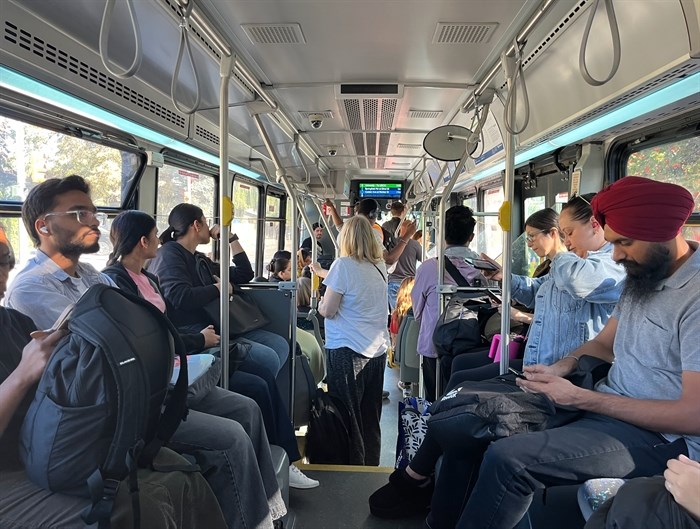'BRUTAL': Kelowna transit system not keeping up
Sam Woods has been navigating the inefficiencies and vagaries of the Kelowna transit system for a decade.
She knows it’s often unreliable, some days impossible so she always has two alternative plans in case a bus is late or does not show up. At some points, both plans have failed leaving Woods with no transportation.
“Every single bus was late or not working out,” she said. “I’m used to things going wrong, but that was a new level.”
She was left with no communication from the bus line about the cancellation, or an alternative offered, but that’s also something she has come to expect.
“I find now the buses don’t come on time and my biggest issue is they just don’t show up at all,” Woods said. “It’s just brutal.”
Kelowna is a city that can make it seem like owning a vehicle is the only viable option to travelling from one end to the other. Traffic isn’t so bad yet that buses start to creep up on vehicles for efficiency. The City is also trying to limit vehicle use, by reducing parking spaces in new buildings and issuing a moratorium on new drive-thru services.
READ MORE: Kamloops city council may pull 'public inquiries' from meetings as disruptions continue
That puts the focus back on public transit, but the system isn’t keeping up. Wait times can often range from as little as 15 minutes between each bus to over an hour wait for the next option, depending on the time of day and location within the city.
Once on the bus, what would be a 15 minute car ride can become an hour long commute. The extra travel time paired with the infrequency of bus scheduling demands preparation for any outing for passengers. Their day needs to be planned around the bus schedule.
“I feel like Kelowna is just quickly advancing,” Woods said. “A lot more people are coming in but there’s no planning, properly, for the amount of people.”
Woods and other riders seem to agree that the infrequency with which buses motor through the city, the cost and growing population, more and better schedules are needed to enhance the system to make it easier for all riders.
Woods often shows up to school half an hour early because of the limited transit routes available on her one-hour commute.
D’Lise Barret shares her frustration.
“All the ones that run in town, in Kelowna, run every 15 to 20 minutes and at the end of the day they run every 30 to 45,” Barret said. “But the buses that run outside of town, like the ones that go up to McCulloch … don’t run as often because they’re not as busy and that’s when you really have to plan ahead to get there on time. You could end up even an hour early.”
Like many other residents, Barrett has a primary bus route plan as well as a secondary plan to use if the original route falls through, in case of delays or unexpected cancellations.
In 2014, the population of Kelowna was 124,951. As of 2024, the population grew to 160,507.
There are currently “28 routes, 100 buses and over 190,000 hours of service annually” in the Central Okanagan, according to the city site. Over five million bus trips are taken by transit each year and residents feel this number is needed to grow as the population continues to rise.
Bus passes are currently being sold for $70 a month for an adult pass, $176 for a college semester pass or $2.50 for a single ride. Day passes and 10 bus rides tickets passes are also available. While generally affordable and cheaper than driving a personal vehicle, the passenger surrenders the rights to have a secure, dependable and timely ride at their disposal.
READ MORE: 'No' campaign expects narrow victory in Build Kamloops petition process
For some, buses are a vital means of transportation and can affect the trajectory of a tightly scheduled day.
Eric Metin takes the bus almost every day for his commute to and from work. He regularly shows up half an hour early and must leave at an exact time, or he will be waiting another hour to catch his nightly ride home.
If he gets out of work late by even five minutes, his entire night is set back by an extra hour.
“Bus drivers are chit-chatting with each other and they will come like 10 minutes late, so I will be late because of their personal interests,” Metin said.
Metin expresses his frustrations with the current transit system and explains that for convenience sake, buses should be more frequent for riders who don’t have personal cars to use or have destinations too far to walk.
“I want it to be more efficient, I want it to be more timely,” Metin said.
To contact a reporter for this story, email Bailey Zimmer or call 250-808-0143 or email the editor. You can also submit photos, videos or news tips to the newsroom and be entered to win a monthly prize draw.
We welcome your comments and opinions on our stories but play nice. We won't censor or delete comments unless they contain off-topic statements or links, unnecessary vulgarity, false facts, spam or obviously fake profiles. If you have any concerns about what you see in comments, email the editor in the link above. SUBSCRIBE to our awesome newsletter here.




